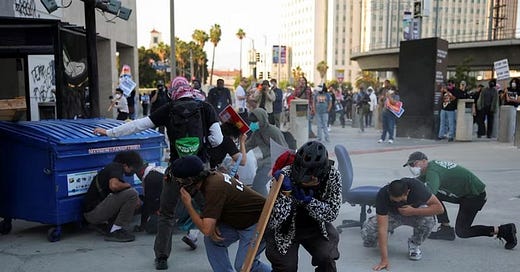As L.A. erupts in protest against a series of ICE arrests, we will hear the conservative and liberal media describe the protests as “violent” or “dangerous.” Of course, these descriptions may be accurate…in a sense. When it comes to political contexts, however, it is rare that words simply and innocently describe. They are loaded with political meaning, and their use has political consequences. Conservatives understand this well. MAGA folks often object when the January 6th protest is called a “riot” or “insurrection.” “Insurrection,” for example, implies a traitorous uprising, whereas its supporters think of January 6th as a patriotic defense. Moreover, the term “insurrection” creates political momentum of a sort. It helps legitimize aggressive state persecution against those involved.
Similarly, contrary to my friends who insist that “violent protest” merely describes a given protest, that framing is loaded with political significance. It tends to convey that the relevant form of protest is senseless and unhinged, thereby vindicating––in the public conscience––aggressive police measures to subdue it.
In this sense, calling these protests “violent” is misleading. There is plenty of scholarship examining how calls to aggressive protest are not senseless acts of anger but, rather, can express political indictment of the social contract. There is a political message in the act, in other words. Speaking only for myself, when I witness a rock thrown through the window of an ICE detention facility, I read that as a statement of this sort: “this institution is politically illegitimate––racist and abusive––and we won’t tolerate it.” A rock isn’t merely violent, then. It is political and expressive.
In fact, we readily understand the political message of violence in more mundane cases. Suppose an ordinary person approaches you on the street and says, “you’re not allowed to be here. If you don’t leave, I’m going to throw you in the back of my car and take you away.” When you physically resist this person, it isn’t merely an automatic act of self-defense. It can also be an act loaded with political expression––for example, conveying condemnation of the assailants presumed authority to treat you this way. Someone might insist that you’ve acted “violently,” and, in a sense, they’re right. But that’s misleading. The act carries a message, and we need to wrestle with that message.
For a historical case, can you imagine our mainstream media outlets recapping the events of the Boston Tea Party by saying, “the violent Boston Tea Party…”? They probably wouldn’t pick that language and, probably, that’s because they think the act was a legitimate form of resistance to an illegitimate institution of the state.
So, to return to the case above, if a random gang tried to remove you from a space, it would be more natural to describe your act as “resistance.” Similarly, if ICE is functioning illegitimately––a claim I invite you to consider––it may be more natural and complete to describe the protests in L.A. as resistance.1 You might not agree, morally speaking, with each act of resistance–-with each stone thrown, for example. You might even think resistance is entirely unjustified. The point is that, “it’s violent,” woefully under-describes the political meaning the L.A. protests. In fact, it likely distorts the real meaning of these events, and its the real meaning that deserves our consideration.
Finally, there is a different point I can’t stop thinking about today. It’s not just that descriptions such as “violent protest” are politically loaded and potentially misleading. In addition, their constant use in reference to the events surrounding a protest functions to create a conceptual monopoly. Those in power become conceptual arbiters, deciding how attributions of “violence” do and don’t get used. In practice, this usually means violence is seen as a property of the protest and the marginalized groups involved, rather than a property of the police, the state, or the system itself.
This invites a refrain. If it’s violence we’re concerned about, perhaps we should be talking about the violence inflicted against Palestinians, immigrants, the poor and working class…all perpetuated by a violent, imperialist, exploitative, supremacist system.
These ideas are put best by Mariame Kaba and Kelly Hayes who are worth quoting at length:
If your tactics disrupt the order of things under capitalism, you may well be accused of violence, because “violence” is an elastic term often deployed to vilify people who threaten the status quo. Conditions that the state characterizes as “peaceful” are, in reality, quite violent. Even as people experience the violence of poverty, the torture of imprisonment, the brutality of policing, the denial of health care, and many other violent functions of this system, we are told we are experiencing peace, so long as everyone is cooperating. When state actors refer to “peace,” they are really talking about order. And when they refer to “peaceful protest,” they are talking about cooperative protest that obediently stays within the lines drawn by the state. The more uncooperative you are, the more you will be accused of aggression and violence. It is therefore imperative that the state not be the arbiter of what violence means among people seeking justice.2
None of this implies that each and every act happening in the L.A. protests is morally justified.
Hayes, Kelly, and Mariame Kaba. Let This Radicalize You : Organizing and the Revolution of Reciprocal Care, Haymarket Books, 2023.





